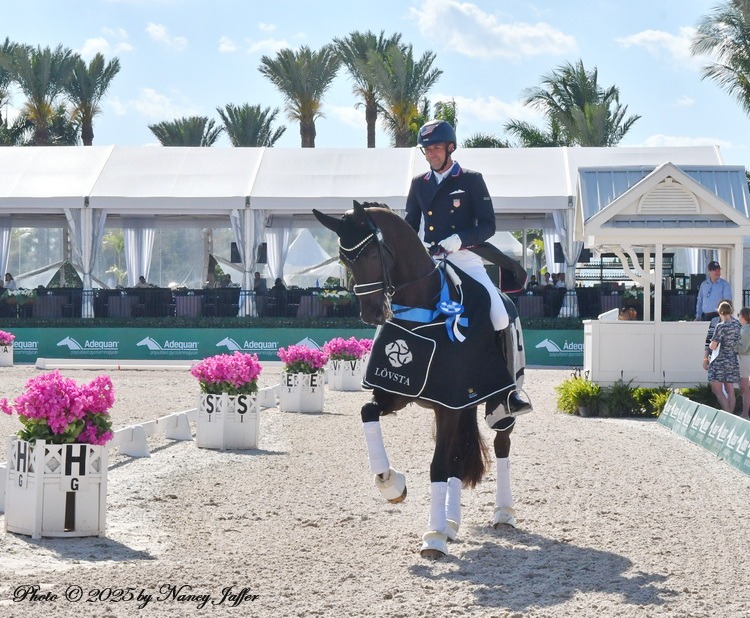
by Nancy Jaffer | Mar 27, 2025
Things were pretty quiet at the Adequan Global Dressage Festival on Thursday afternoon in Wellington, Fla. No one was in the stands, there were only a few people along the rail and the VIP area was peaceful.
But the wind ruffled the canvas on the tents around the ring, so when Jane made her entrance for the 4-star Grand Prix, she reacted.
The mare reared before she got close to the entrance of the arena. Remember Fury from the old TV show? She did a pretty good imitation.
As usual, however, her rider, Marcus Orlob, was on the case. Unflustered, he got her going, went down centerline and put in a winning test.
True, it wasn’t the sensitive mare’s best effort, but it was her third victory this season. Her talent is undeniable and when she pays attention to business, she shows some spectacular moves.
But then there are the distractions.
The Dutchbred daughter of Desperado spooked in the canter half-passes, getting uncharacteristic marks of 3’s and 4’s. The other mishap occurred in the flying change between the pirouettes, with three 4’s and a 5 along with a 7 (everything depends on vantagepoint from where a judge is sitting.)
The scores strengthened as the test drew to a close and she was awarded 8’s for her definitive passage down the final center line. Marcus and Jane were the only ones among 13 entries to break 70 percent, finishing on 70.630 percent, though two judges graded the performance at 71.413.
“I was actually disappointed a little bit, but somehow proud of her. Compare the entrance to the performance it was not that bad. Once she’s in the ring, she usually starts to settle. I think the good horses are a challenge,” said Marcus.
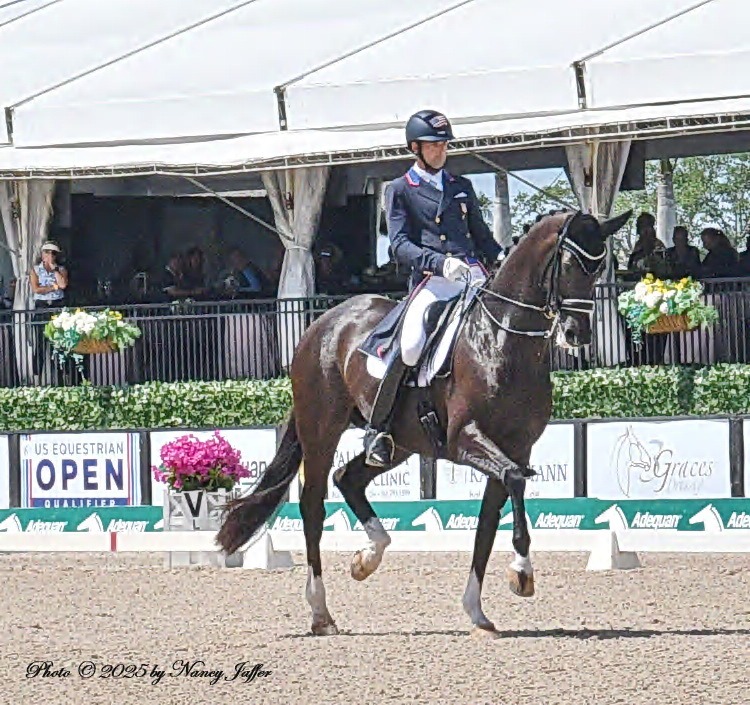
Look at the synchrony that Jane is showing in passage. (Photo © 2025 by Nancy Jaffer)
“I would like for her to go in the ring and feel calm and she keeps breathing. That’s my goal. She’s a fantastic horse. She’s just afraid.”
She’ll be seen again Saturday in the Special.
Why not the featured Friday Night Lights Freestyle, I asked Marcus.
“I didn’t want to start right away giving her too much atmosphere,” he explained.
“I think to do right away the lights with that many people, it’s too early for her brain, so I wanted to take it a little bit more easy on her. I have to be careful I don’t completely scare her. You see how she acts up around the ring. She’s afraid and stands up. I don’t want to give like a complete rodeo show here to the people.”
He’s been taking her over to the busy Winter Equestrian Festival down the street to get her accustomed to the buzz, where she doesn’t have to perform a test and he can desensitize her without an audience.
A native of Germany who is a U.S. citizen, Marcus began competing Jane for her owner, Alice Tarjan, who felt the mare needed a stronger rider. Marcus, who has been Alice’s trainer, made the Olympic team in Paris. But Jane spooked when entering the ring as she tried to follow another horse out and cut herself. The tiny scratch showed up on a white leg and she was disqualified under the blood rule.
Now his goal is to be among the six U.S. riders who will go to Europe this spring and he hopes to be chosen for the team that will compete at Aachen. That’s important, because it will be the venue for the world championships in 2026.
When Marcus has Jane’s attention, he’d like to work on getting “the neck a little bit out and softer again. And I think the piaffe/passage will be more expressive, softer through the body. I get the changes a little bit softer. But now I have a little bit the emergency grip that she doesn’t spook, that I keep her a little bit more conservative with me.”
He does feel it all can happen when she gets desensitized and trusts him.
Second place went to Kasey Perry-Glass on Heartbeat, marked at 68.022 percent. She figures to be the favorite for the freestyle.
Click here for results

by Nancy Jaffer | Mar 15, 2025
It’s been more than five very long years since show jumper Kevin Babington had a life-changing accident when his horse fell with him in a grand prix.
A spinal injury that paralyzed the Irish Olympian from mid-chest down has meant he can’t walk, use his hands or at this point, even cough effectively – leading to his hospitalization for pneumonia for two weeks.
As of March 25, he finally came home after a tough battle.
“His spirit is undeniably resilient,” Kevin’s wife, Dianna, said on social media.
“I have never met anyone so tough, mentally and now physically. Thank you to all for your prayers and support.”
Obviouslly, his situation has not dimmed Kevin’s spirit or determination to carry on. He is eager to be teaching lessons again at his home stable in Loxahatchee, Fla. He also has been available to do consulting work for those seeking his expertise with horses.
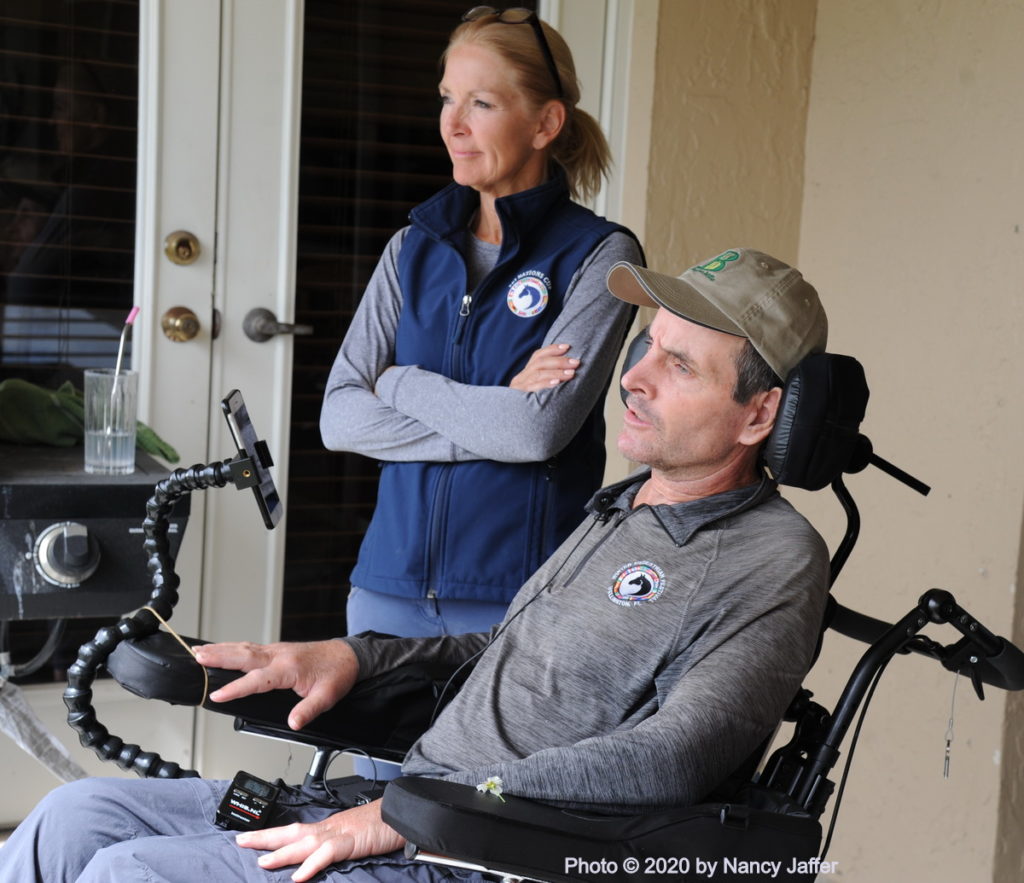
Dianna and Kevin on the porch of tvheir home, Kevin’s teaching vantagepoint. (Photo © by Nancy Jaffer)
There’s always a struggle, but the bright light is that he is not alone. In addition to his wife and daughters Marielle and Gwyneth, there are many who rally for his cause time and again. They will be involved with a major event this Sunday, March 30, at Erica Hatfield’s EyeCandyland Farm in Wellington, Fla. It’s Kevin’s Rockstars Lip Sync Fundraiser, offering creative and zany entertainment that draws the equestrian community as both participants and audience.
The event benefits the Kevin Babington Foundation, which raises funds and generates support not only for Kevin, but also for other show jumpers who sustain spinal injuries. In addition to providing financial assistance the foundation’s mission includes educating riders, trainers and show organizers about safety measures designed to reduce the risk of serious injuries which can occur while riding.
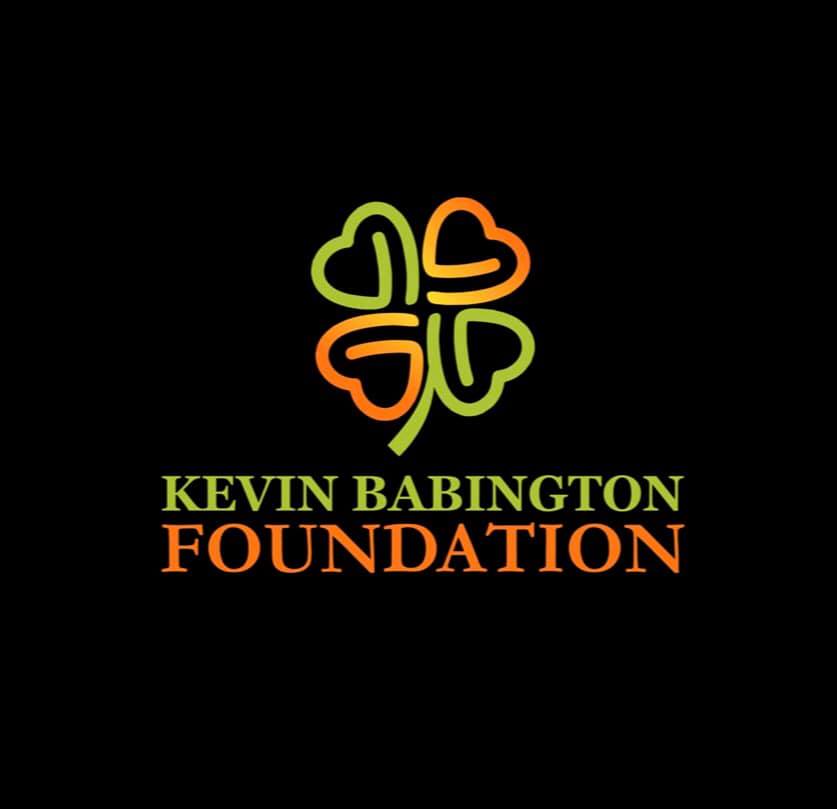
For past Lip Syncs, big name riders, including Olympic gold medalist Nick Skelton of Great Britain, Ireland’s Darragh Kenny and the USA’s Heather Caristo got their acts together to show their creative side. This month’s show will feature the singing janitor, Richard Goodall, who won the 2024 season of America’s Got Talent.
“His heart, humility, and spirit perfectly represent our foundation. I knew we had to get him to perform,” said Foundation Chairman Jeff Papows.
Commenting on Kevin’s condition, Jeff said, “We have seen the incredible support and love pouring in at this time. The doctors have been doing a great job in managing Kevin’s condition and are working to get him back home as soon as possible.”
While Kevin can’t have visitors at this time, click here to get a form on which you can send a note to Kevin wishing him well. Jeff noted Kevin is determined to see the Lip Sync, always a highlight for him.
“We try to make sure people want to come every year, because they’re getting something for their money,” Dianna noted about the event.
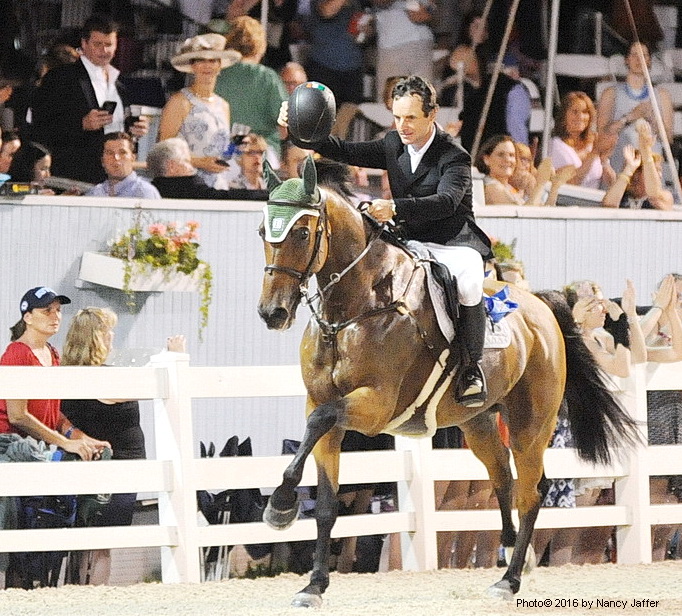
Kevin and Mark Q after victory at Devon nine years ago. (Photo © 2016 by Nancy Jaffer)
Last year, Kevin suffered a setback when the ramp to his van failed, his wheelchair crashed to the ground and he hit the back of his head. He will need spinal surgery, as well as having a hip replaced.
“This is a stark reminder that this is not something that gets fixed,” Dianna observed, noting other equestrians have problems with which the foundation is helping.
“This is an ongoing medical tragedy. There’s always another shoe that’s about to drop, and it’s not just him. This is not something where we throw money at it and fix it and walk away. This is ongoing. There will be future recipients.”
Dianna said if she outlives Kevin, she will continue working with the foundation. She is one step removed right now, wanting to make sure there is no conflict of interest, but is involved in the Lip Sync and other events.
“I want people to come and participate, if not this year, next year. It is for Kevin and everybody who has come after him, and will come again after him,” said Dianna, noting “It’s a constant battle.”
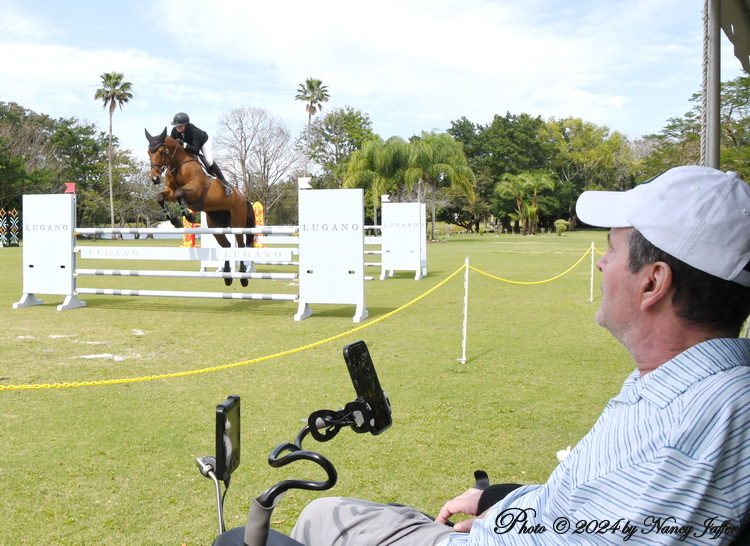
Kevin is a good teacher who understands show jumping from a variety of perspectives. (Photo © 2024 by Nancy Jaffer)
People can purchase a table to be part of the evening, or simply donate to the foundation. The need continues.
“This is never over,” is the way Dianna put it.
Click on this link to purchase tickets or tables for a very special cause.
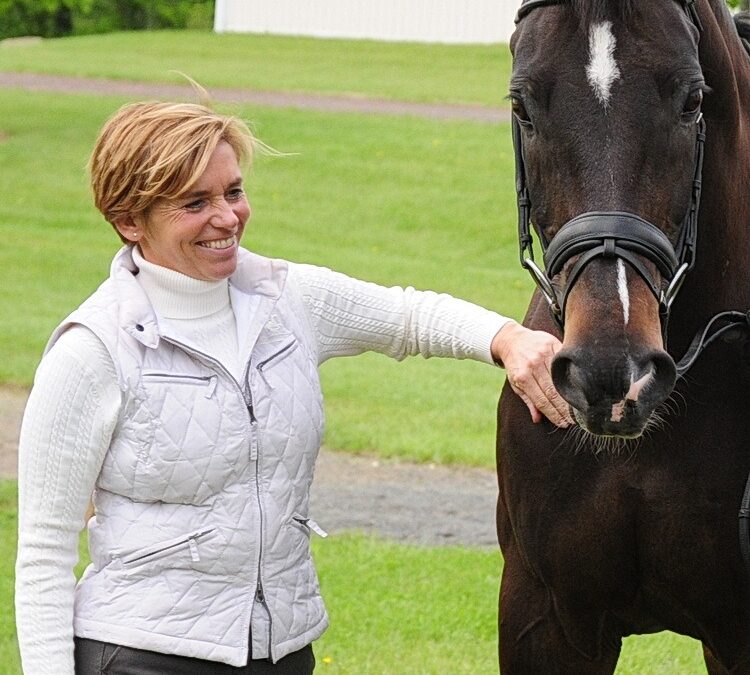
by Nancy Jaffer | Mar 23, 2025
Vera Kessels, a much admired dressage trainer, rider and effective clinician, died March 22 of ovarian cancer.
A native of the Netherlands with ties to the horse-dealing Hendrix family, she moved to the U.S. in 1995 with her Dutchbred horse, Dotato. They started showing a year later and continued through Dressage at Devon in 1998. Other mounts with which she had success included Urbanus and Jane Suwalsky’s Whitman.
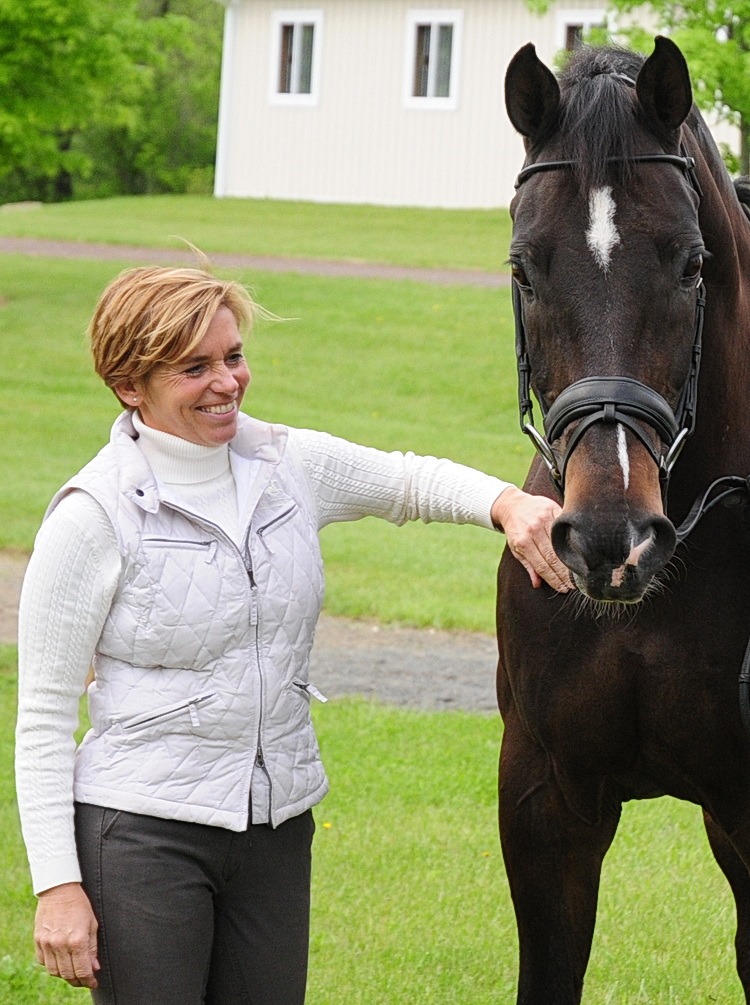
Vera Kessels, who always shared her sunny smile. Photo © by Nancy Jaffer)
Vera married U.S. dressage rider Michael Barisone, who began showing Dotato in 1999, and the two ran the Hathorne Hill training stable in Long Valley, N.J. The couple later divorced.
She was a respected teacher. As trainerEliza Puttkamer Banks put it in a tribute on social media, “I owe where I am right now and the confidence I have, to Vera. One of the most outstanding supporters of our sport from the center of the ring, always keeping correct training and understanding of the horses as sport. We have lost one of our shining lights.”
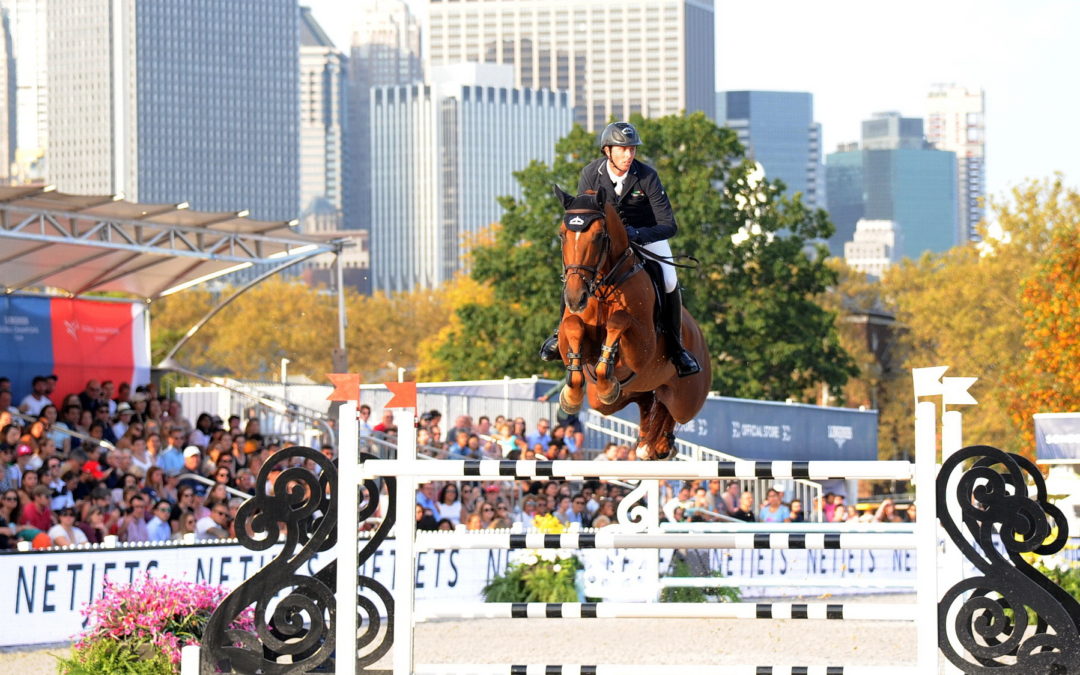
by Nancy Jaffer | Mar 20, 2025
The high-profile Longines Global Champions Tour is coming to Liberty State Park in Jersey City, bringing top level show jumpers from around the world to a new venue for the series.
They’re calling the Sept. 19-21 competition the Longines Global Champions Tour & GCL (Global Champions League) of New York, naturally — because New Jersey too often gets no respect. But the closest the show jumpers will get to New York is looking at the impressive view, which includes the Statue of Liberty and lower Manhattan.
The tour’s previous location in the area was Governors Island, which involved a lot of maneuvering. The only access to the venue was by boats and ferries, which was a logistical nightmare.

The Longines Global Champions Tour had a great view of Manhattan when it was on Governors Island. Photo © 2019 by Lawrence J. Nagy
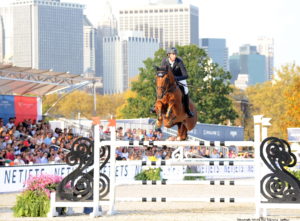
Ben Maher competing on the Global Champions Tour when it was at Governors Island.
The tour last landed there in 2022, but GCT “always wanted to go back to New York. It’s a key city,” said the tour’s public relations manager, Floss Bish-Jones.
She explained that the tour, which has stops in London, Europe and the Middle East, is designed to offer people in the cities a chance to attend a sport they normally wouldn’t have a chance to see, and features dramatic backdrops for the competition.
The park hosted the Veuve Cliquot Polo Classic and is in horse-friendly surroundings, an important element because of the tour’s concern for horse welfare, said Floss.
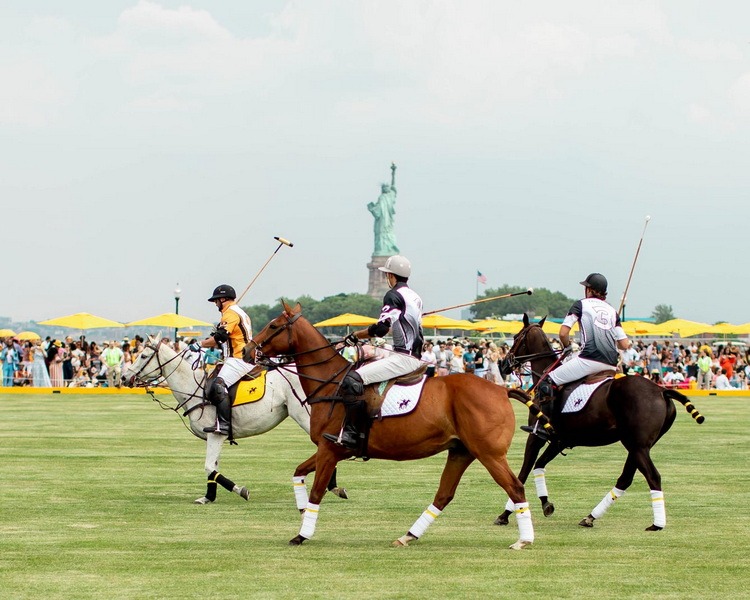
Polo at Liberty State Park.
This will be the tour’s only location in the U.S. this year, since its Miami Beach leg had to be cancelled because it clashed with next month’s FEI World Cup Finals in Switzerland.
Tickets will be available in April, and announcements of events around the competition will be forthcoming in the effort to involve people in the region.
by Nancy Jaffer | Mar 23, 2025
An arduous new requirement that managers of all equestrian competitions in the country would have to register with and report to the U.S. Department of Agriculture will not go into effect during 2025 show season.
The requirement was part of a proposed amendment to the act, which originally was designed to stop the practice of soring in Tennessee Walking Horses and breeds that were abused similarly. USDA and its Horse Protection team will continue to work on what’s next,including additional postponement, and will continue to seek stakeholder input.
Click here to read a story that explains the background of the process to amend the act.
t
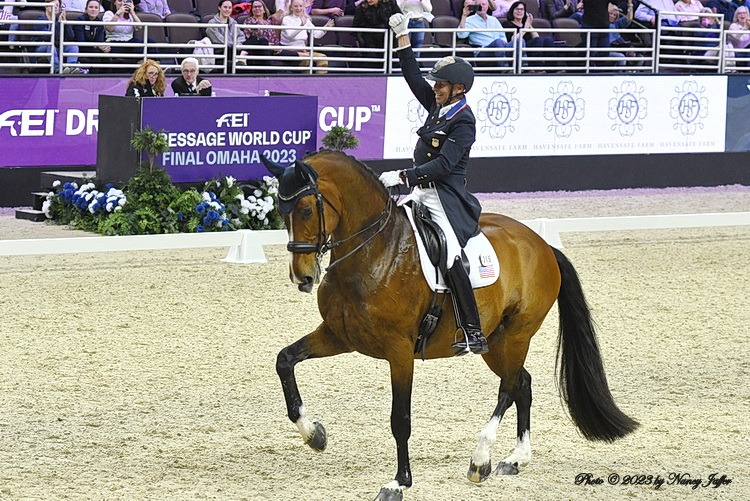
by Nancy Jaffer | Apr 21, 2025
Olympic dressage and World Championships team medalist Steffen Peters is offering a two-day clinic June 7 and 8 at the U.S. Equestrian Team Foundation in Gladstone, N.J.
Auditors can enjoy the rare opportunity to learn from the former World Cup champion for a fee of $60 per day. One of the USA’s most decorated competitors and a mainstay of the team for nearly three decades, Steffen is known for his supportive teaching style as he offers instruction on the way for horse and rider to improve their performance.

Steffen Peters at the FEI Dressage World Cup Finals in 2023. (Photo © 2023 by Nancy Jaffer)
Lidiya Frumoval, who is organizing the sessions, noted that Steffen does only a few audited clinics annually, but the amateur trainer noted proudly that with persistent texting, “I wore him down.”
There is a waiting list for participants, who are paying $450 a day to ride in front of Steffen. However, as Lidiya noted, just being able to audit the clinic with the California-based rider is a valuable learning opportunity. Steffen will work for an hour with each rider, with participants ranging from First Level to Grand Prix.
Vendors will be on site with wares including boots, saddles and apparel.
To register, contact Lidiya at frumoval@gmail.com

















